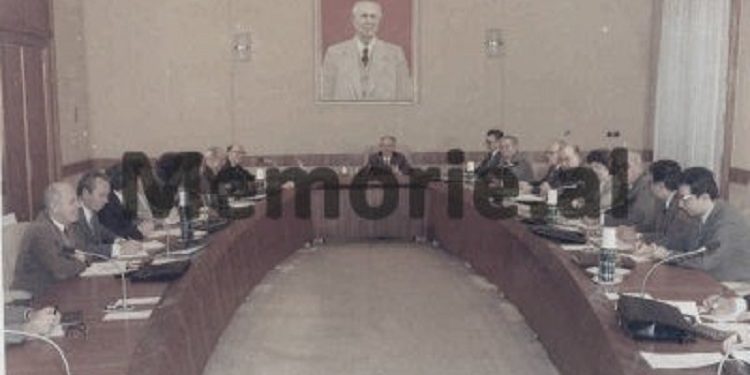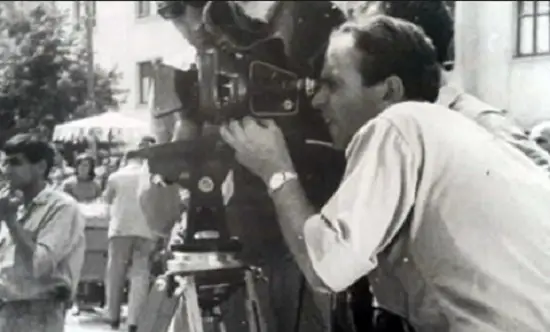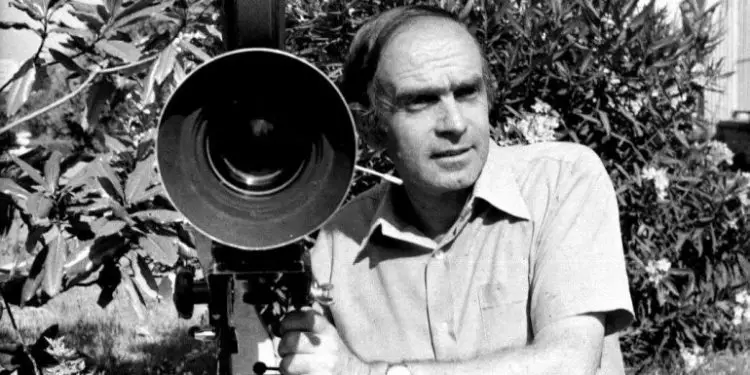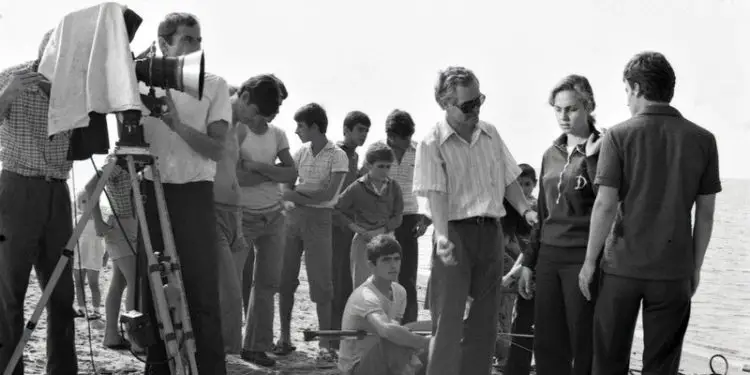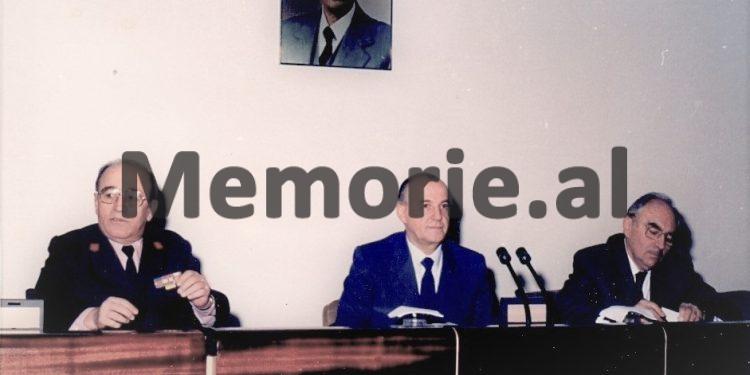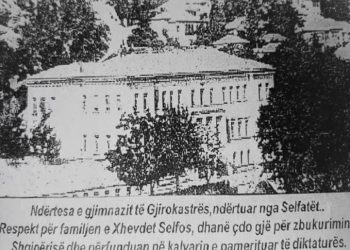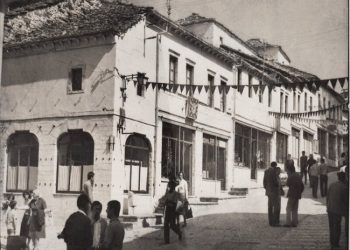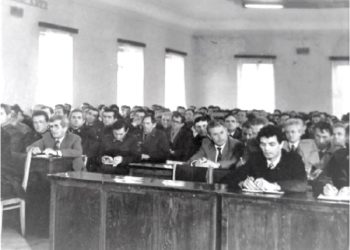Dashnor Kaloçi
The third part
Memorie.al publishes some archival documents taken from the Central State Archive in Tirana (fund of the former Central Committee of the ALP), belonging to 1990, where there is a record of the meeting of the secretariat of the Central Committee of the ALP which, as the main item on the agenda, had “on some issues of today’s cinematographic creativity” and in that meeting which was chaired by the First Secretary of the Central Committee of the ALP and the Chairman of the Presidium of the People’s Assembly of The People’s Socialist Republic of Albania, Ramiz Alia, in addition to the secretaries of the Central Committee such as: Foto Çami, Hekuran Isai and Lenka Çuko, also participated some of the highest officials of the party and state leadership of that time, such as: Spiro Dede, Abdyl Backa , Ali Vukatana, Sotir Koçollari, Alfred Uçi, Dritëro Agolli, Lisen Bashkurti, Skënder Gjinushi, Neritan Babamusta, Dhimitër Shandro, Marash Hajati etc. The full minutes of the meeting with conversations and discussions between Ramiz Alia and the senior party and state leadership of that time, with the main leaders from the creative sector of Kinostudio “Shqipëria e Re”, such as: Teodor Laço, Dhimitër Anagnosti and Nexhati Tafa, who dwelled at length on the problems of Albanian cinematography.
“Both ways seem to be rational and useful. Complete studies are also necessary, e.g. students of the directing branch at the Higher Institute of Arts, can study for directing after finishing 3-4 years of school. In general, and in other parts of the world, directors prepare after graduating from high school. Directing studies are a second school for them. In many cases, those who prepare for directing do not go to the faculties of drama or directing, but to other faculties, especially the faculties of literature. To date, we have not practiced this, but with those of the director, because at the present time usually the director of the film is also the author or co-author of the screenplay. This would be one way of full professional preparation. The second way is to prepare the staff we have with postgraduate courses with a short period of 1 year for directing. For example, this year we successfully closed a postgraduate course with 4 students of directing, who made two good films. To prepare for the first road we sent a student to France who will study 4 years of directing. However, he is the only one and, in my opinion, seeing the demands that Kinostudio has today, it is very little …!”
This was stated, among other things, in his speech at one of the meetings of the secretariat of the Central Committee of the ALP of 1990, Teodor Laço, then head of the script editorial office at the Kinostudio “Shqipëria e Re”, a meeting on “Some issues of today’s cinematographic creativity ”, which was chaired by the First Secretary of the Central Committee of the ALP and the Chairman of the Presidium of the People’s Assembly of the People’s Socialist Republic of Albania, Ramiz Alia, where in addition to other secretaries of the Central Committee, as Photo Çami, Lenka Çuko and Hekuran Isai, were also present in most of the senior party and state leadership of that time that had direct or indirect connections with art and culture. For more than what was discussed in that meeting where besides Teodor Laços, from Kinostudio “Shqipëria e Re”, participated also the director Dhimitër Anagnosti and the screenwriter, Nexhati Tafa, the document in question introduces us to the minutes of that meeting, which Memorie .al publishes it in full and for the first time, starting from this number.
Followed by the last number
Minutes of the meeting of the Secretariat of the Central Committee of the ALP, with the staff of the creative sector of Kinostudio “Shqipëria e Re”
COMRADE RAMIZ ALIA: They do not receive any reward in Kinostudio for the films they make?
COMRADE DHIMITËR ANAGNOSTI: They do not receive any reward, they only receive a diet, like all employees. We find it difficult to justify, even a small expense incurred in the interest of filming while the actors are preparing to be able to continue filming.
COMRADE RAMIZ ALIA: For these types of expenses, you must receive a receipt…?
COMRADE DHIMITËR ANAGNOSTI: Neither our receipts are justified. Let me return once again to the problem of the market of our film abroad, which I see not only as a circulation of ideas, but also as a great financial opportunity to renew our technique. For this purpose, a special organization should be created, passivity in waiting for letters and correspondence should be avoided. This organization regularly leads specialized people to the fairs where the film is sold and I do my best to sell our films. The films of the world, in terms of level and subject matter, are no better than many of our films.
COMRADE RAMIZ ALIA: Good Dhimitër, Nexhatiu has the floor.
COMRADE NEXHATI TAFA: In addition to those problems posed by friends, I think it is probably the moment for our cinematography to address other topics from today’s world literature, especially Kosovar literature. At the same time, it must continue to address successfully, as so far, the patriotic topic and other topics from Albanian literature. As the experience of world cinematography shows, various works or novels belonging to the literature of other countries have been taken and screened from many countries. For example, the French shot the film “The General of the Dead Army”, based on Kadare’s novel. Rossi is shooting a film based on Marquez’s novel or stories. This is a permanent practice.
COMRADE RAMIZ ALIA: Is there any interesting topic or novel that could be taken from world literature?
COMRADE NEXHATI TAFA: There are many. I would say that our publishing houses are generally doing this mission better than we do. They have published many works of Kosovar literature. For example, Rexhep Qose’s novel “Death comes to me from such eyes”, in its middle 2-3 chapters could be very suitable for a contemporary film.
COMRADE PHOTO ÇAMI: It seems to me that Kosovars themselves made this novel.
COMRADE NEXHATI TAFA: They have also realized a variant.
COMRADE DRITËRO AGOLLI: There are many other Kosovar historical novels that can be made into films.
COMRADE RAMIZ ALIA: The issue raised by Nexhatiu may be of interest. How much does a movie cost?
COMRADE TEODOR LAÇO: Six million ALL and more.
COMRADE DHIMITËR ANAGNOSTI: Therefore, this contradiction requires a solution. It is necessary to create such a creative team to make quality films and not from those films that cost the economy and give nothing spiritually.
COMRADE RAMIZ ALIA: Have you made any calculations, what is the relationship between the production and the income in Kinostudio?
COMRADE ALFRED UÇI: About 50-60 percent of the expenses are covered with income for the feature film, but the film studio has other additional expenses…
COMRADE RAMIZ ALIA: My question was a continuation of the issue raised by Dhimitri and Nexhatiu, that by offering higher quality films, the income should be higher. Quality films provide greater revenue, so they are profitable and economical.
COMRADE PIRRO KONDI: Do not compete to produce as many films as possible, because competition is dangerous.
COMRADE ALFRED UÇI: We have another problem: almost half of feature films become black and white.
COMRADE RAMIZ ALIA: But why do we continue to produce black and white films?
COMRADE ALFRED UÇI: It goes on to say that in order to move on to the production of color film, additional funds are needed. But nowhere in the world do they now produce black and white films.
COMRADE RAMIZ ALIA: Now I can’t even watch black and white movies on TV.
COMRADE SPIRO DEDE: I support my friends for all the problems they raise. I have been connected with my film studio friends as before, not only now that I cover this sector. They need the specialization of the people, the updated technique, a better work structure. In recent years, there has been a lot of talk among friends about finding more concrete, more accurate and faster solutions to these problems.
Kinostudios friends work, but even in these conditions there are opportunities to do more. There are opportunities for better quality scripts to be required and not to make films to supplement the annual plan figure.
The issue of making 14 films a year must be seen, but the creative forces in the film studio are not few. If there are forms that are not very skilled, or do not do the work that needs to be done, then even there remove the incompetent people, as is done in any other sector. Even screenwriters working in the film studio are not the first.
Kinostudios’s friends should see these issues. It is true what Comrade Dhimitër said, that there are still some forms of organization that belong to the time when Kinostudio produced 3-4 films a year. The issue of restructuring should also be considered.
There has been talk for years about rewarding directors and artists for the artistic values they create. For this purpose, that savings from movies can also be used. I have collaborated with my friend Viktor and Dhimitri and I know that in many cases the director stays in the studio for days, until the morning and does not receive any reward, except for the artistic motives, which are moral and one of the best that a person should have… But despite these motives, we must nurture them, they must not prevent us from using any other stimulus for those people who sweat sparingly at work. I think that there are opportunities to use material incentives, without the need for the state to invest. It is better not to produce a poor film that requires 800 thousand ALL and those expenses to be used for material incentives to artists. There is also room for improvement. Costs for a film are calculated on the basis of an average. Why should these expenses reach up to 600-700 thousand ALL for each film? Could it be 400-500 thousand ALL. Specialists should look at these problems and come up with concrete proposals in the Committee of Culture and Arts to decide to be stimulated by the director, cameraman and others.
In our Kinostudio there is another problem that has to do with the possibility of moving as fast as possible. Our films can be cast on video and promoted in foreign studios. This can be done quite easily. It could be followed even more for such a practice for those who come here and look for Albanian films.
I think that Kinostudio itself has the opportunity to do much more, to provide better specialization of people and greater financial means, in addition to those provided by the state.
I saw the draft decision prepared for this meeting and it seemed to me that the issues were well defined. Another problem is how much the state will be able to do the renovation of Kinostudios. However, I think that with these forces that he has and with the different paths that he can follow, he can achieve something by collaborating with foreign studios, working for studios, etc. These opportunities must be used, otherwise the decision that will be taken will remain unfulfilled again, because these problems have been raised for 10 years. Such a spirit of procrastination of problems exists a bit in Kinostudio.
The question you asked, Comrade Ramiz, is very fair. If the practice is followed that the film lasts as long as it lasts, keeping the actors engaged for days beyond the set deadlines, even the theater and other institutions will not be interested in letting the actor engage through movies. Therefore, the deadlines must be respected.
COMRADE RAMIZ ALIA: Well, clearly. Next you will discuss?
COMRADE ALFRED UÇI: I wanted to say a couple of problems that were not touched upon here. Regarding the qualification, I think that Kinostudio has a positive experience, but in general it has followed an empirical path. Perhaps in addition to the minimal needs necessary for overseas specializations with the two paths mentioned, they should be given more attention by Kinostudios and the Culture Committee, creative studios that we have organized these last two years. This studio has not expanded its activity in all directions, because among other things, its direction there has been done by artistic leaders, who pursue many problems. If the work was well organized, for this studio to become a real school for the qualification of all the staff, not only the directors and screenwriters, this would facilitate all the work.
I think that this issue will be given great importance, as it has been given in some other institutions, such as the Opera and Ballet Theater, the National Theater, etc.
Another problem that remains unresolved at Kinostudio is the disproportion that exists between the film production and film distribution sectors. After using many forms of organization, recently the film distribution sector depends on Kinostudio. But in fact, cinemas in the districts depend on the Executive Committee. So, there is a division between interest in producing films and interest in distributing them.
The condition of cinemas in the districts, in general, is extremely bad. These two links must be connected, so that the film studio is interested, not only in the production, but also in the distribution of the film. The obstacle that exists is administrative. The Executive Committees of the districts, having many problems, pay almost no attention to the maintenance of cinemas, their equipment and generally the use of equipment.
I think the branches of film should be directly dependent on the film studio. Of course, they can also answer to the district executive committees, as all institutions do.
COMRADE RAMIZ ALIA: Is this work a very heavy burden for Kinostudio?
COMRADE ALFRED UÇI: That’s right. For this purpose, Kinostudio must have its own camera, because now it has 2-3 people.
COMRADE RAMIZ ALIA: Although it may have an apparatus, it seems to me difficult to get Kinostudio with cinemas of Kolonja or Himara.
COMRADE ALFRED UÇI: The Kinostudio itself now demands such an organization and considers it necessary to have a confrontation between income and expenses. Otherwise, there will be no interest in cinemas in the districts. Memorie.al





